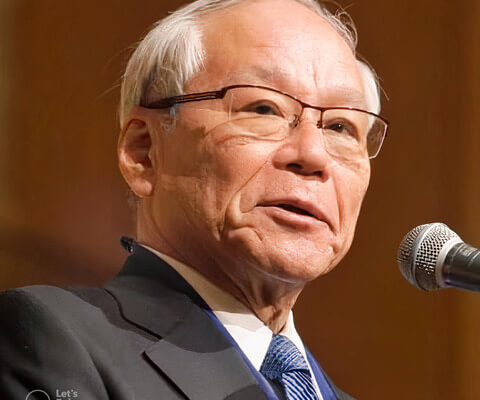Dr. Yoshitake Yokokura is a highly accomplished Japanese physician. Since 1990, Dr. Yokokura has served as the President of Yokokura Hospital. He has also held several notable positions in the medical community, including President of the Fukuoka Prefecture Medical Association from 2006 to 2010, Vice-President of the Japan Medical Association from 2010 to 2012, and President of the Japan Medical Association since April 2012. Dr. Yokokura is also a Council Member of the World Medical Association since 2010 and Councilor and President-elect (2016-17) of the Confederation of Medical Associations in Asia and Oceania (CMAAO). His professional interests lie in surgery, and he is currently a Visiting Professor in Medicine at Kurume University School of Medicine since 2013.
Dr. Yoshitake Yokokura, the current President of the Japan Medical Association, was greatly influenced by his parent’s dedication to the medical profession. He fondly recalls, “In the absence of a medical practitioner in the village, my father, a military physician, took it upon himself to establish a small clinic to cater to the community’s medical needs. I can vividly visualize my parents in their prime whenever I recollect those moments. My father was committed to treating all patients requiring medical attention. He also invested his energy in enlightening people about contagious ailments and made it his priority to keep abreast of the health status of the locals.” He continues, “On the other hand, my mother was an empathetic individual who would willingly part with her kimonos to acquire medications for indigent patients who could not afford to pay their medical bills.”
Observing his parents as he grew up, Dr. Yokokura learned the spirit of healthcare, ‘To make every effort without regard for oneself to help people before one’s eyes who are ill,’ through his daily life. His belief in the physician’s mission to ‘examine the patient’ entails accompanying patients on their journey through life, from birth until death, working together to make their lives healthier. This early experience profoundly impacted Dr. Yokokura’s life, ultimately leading him to pursue a career in medicine.
After obtaining his medical degree from the esteemed Kurume University School of Medicine in March of 1969, Dr. Yokokura began his professional career as an assistant in the university’s surgery department. He then expanded his horizons by working for two years in the surgery department of the Detmold Hospital in West Germany, gaining invaluable experience and knowledge in his field.
Dr. Yokokura has an extensive record of leadership and service in the medical community. He has been serving as the President of Yokokura Hospital since 1990, where he has been instrumental in providing top-quality healthcare services to patients. In 2006, he was elected as the President of the Fukuoka Prefecture Medical Association, where he has been working tirelessly to improve the health and well-being of the people of Fukuoka.
Dr. Yokokura’s parents’ influence on his life profoundly impacted his perspective on healthcare. He expresses his gratitude for the lessons they imparted to him, saying, “As a physician, I am deeply grateful for the lessons my parents taught me about the true meaning of healthcare. Their selflessness and dedication to improving their community’s health profoundly impacted my life, and I carry their spirit of compassion and service with me every day.” He believes that a physician’s mission is not limited to just examining the patient but also accompanying them on their journey towards optimal health and well-being. “My father’s actions and attitude continue to inspire me, and I believe they should serve as the foundation of healthcare for generations to come.”
His accomplishments and reputation have gained international recognition. In 2010, Dr. Yokokura became a Council Member of the World Medical Association, where he has been actively participating in the organization’s efforts to promote the highest standards of medical ethics and patient care worldwide. Dr. Yokokurawas also elected as Councilor and President-elect (2016-17) of the Confederation of Medical Associations in Asia and Oceania (CMAAO), an organization that represents medical associations across Asia and Oceania and works to enhance healthcare in the region.
Inspired by the late economist Hirofumi Uzawa’s vision, Dr. Yokokura sees healthcare as a crucial component of ‘Social Common Capital.’ According to Prof. Uzawa, these social systems enable everyone to lead abundant lives and maintain an attractive society. Healthcare was one of the systems he identified, alongside education, the natural environment, roads, water supply, and electricity. However, for this to happen, certain institutional, social, and financial conditions must be in place for all members of society to receive the best possible healthcare, regardless of their age, gender, or economic and social circumstances. Once these conditions are established, strict regulations must be implemented to ensure that they are maintained. The core of healthcare is to promote the happiness and prosperity of all individuals in society, and this can only be achieved by healthcare specialists carrying out their duties with strict adherence to professional standards and discipline.
Building on the late Professor Uzawa’s vision, Dr. Yokokura firmly believes that healthcare is a fundamental human right that should be accessible to everyone, irrespective of their economic or social status. To make healthcare a reality for all individuals worldwide, Dr. Yokokura is committed to collaborating with international organizations such as the WHO to achieve Universal Health Coverage. His unwavering dedication and strong beliefs aim to contribute towards creating a society where healthcare is not a privilege but a basic right.
In conclusion, he says, “In a rapidly changing world, we must return to the fundamental principles of healthcare and serve humanity using advanced technologies. Let’s create a “society of healthy longevity” where people can participate actively even in old age. Universal health coverage (UHC) is essential for achieving healthy longevity and creating a sense of security in aging societies. Let’s uphold the principles of UHC and strive towards a better future for all.”







